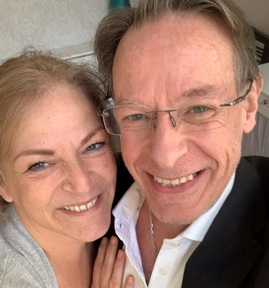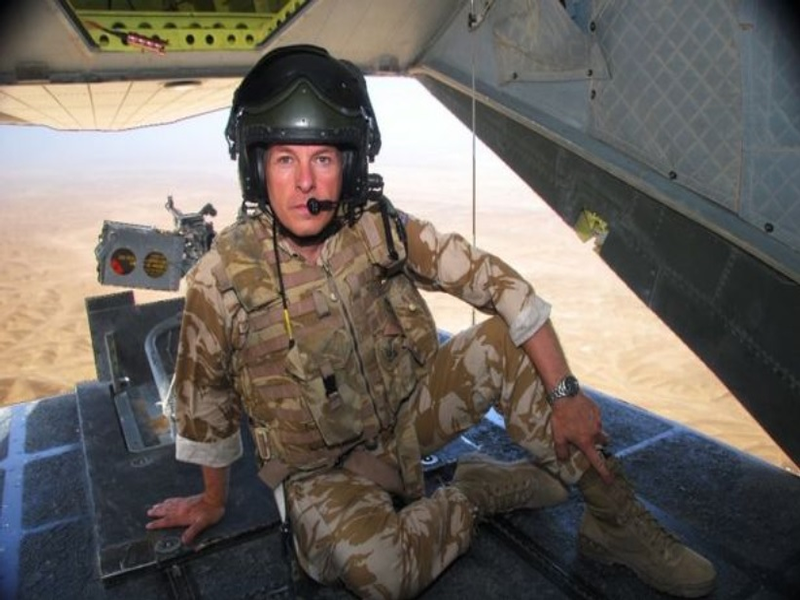Bedbound with long Covid 'I went 12 days without having a shower'
Twelve days without a shower, needing to lie down after brushing your teeth and suicidal thoughts was normal for a couple left bedbound for a year because of long Covid.

While 2021 may have felt uneventful for some, ex-nurse Claire Hooper, speaking as a guest on Let's Talk About Care podcast, found herself crawling to the toilet and says the whole year was "pretty grim" for her and partner Antony Loveless.
Stuck in 'endless loop of nothingness'
Having been teenage sweethearts, the couple had only got together again two years ago but last year they found themselves “stuck in this endless loop of nothingness”.
They thought they had “dodged” the coronavirus in the pandemic until they both tested positive for Covid-19 on 4 January 2021 and got so ill they became trapped in their bed for up to 24 hours a day.
Ex-nurse Claire says: “I mean when we first got Covid we were like ‘Oh well good! We’ve got it out the way then. We’ll have it now, we’ll be under the weather for a couple of weeks’.”
‘I can’t even hold my grandson’
She laughs when she thinks how 14 months later, the impact of the virus means she must lie down after brushing her teeth and cannot leave the house alone in case she gets lost.
“I can’t even hold my grandson” says the mother of four, who used to work as a health visitor making home visits to new mums.
She became a grandmother in 2021 but she says “If that lead curtain of fatigue fall, I may drop him”.
As a result of the couple’s distorted sense of taste and smell, they remember smoked salmon that they were looking forward to eating, tasted and smelled “like dog poo”.
Long Covid has been described as illness that lasts more than 12 weeks after a Covid-19 infection.
Mini-strokes, brain fog, falls, extreme tiredness, heart palpitations and other post-Covid conditions have led to suicidal thoughts for her and Antony who both lost their jobs because of long Covid.
‘I was actively looking to kill myself’

“For most of 2021, we were in bed for 20-24 hours a day”, says Antony who is a former war correspondent, who most recently worked in an investigating role at London Gateway Port.
At one point, Antony felt well enough to return to work but had to go home to bed on his first day back because he suffered a relapse. “I lost my job in May…that really sent me in a tailspin.”
Stuck in bed with no income for much of last year, Antony admitted he didn’t want to go to the ‘Bank of Mum and Dad’ at the age of 55 but was forced to.
“Last year, when I was suicidal. I was actively looking to kill myself.”
Claire recalls having diarrhoea up to 20 times a day and lost six stone and a half, while Antony lost four stone in 2021, which he says he has not put back on.
The couple say living with long Covid is like running on a battery with only 30 per cent power and even talking on the phone uses up 10 per cent of their battery.
“I don’t know how I’m going to be in the next 10 minutes” says Claire, who had to stop talking to lie down twice during the recording of the Let’s Talk About Care podcast.
Claire, whose 12-year-old daughter lives with them, says she now tries to get up to spend a little time with her youngest child when she returns from school. But unable to cook, the couple relied on takeaways and ready meals for much of 2021 and beyond.
'You develop a very black sense of humour'
Claire and Antony, who both regularly collapse when their battery is drained, have been told they are too sick to start rehabilitation in a long Covid clinic.
“You develop a very black sense of humour” says Antony of his life with long Covid.
Long Covid impairs brain function and so people with the condition can experience 'brain fog' and struggle to remember things or find the words they want to say. The couple’s cognitive decline coupled with the complexity of applying for a Personal Independence Payment (PIP) forced them to find an advocate to help complete a 50-page PIP application form.
But Claire and Antony still had a seven-month wait before receiving PIP money. PIP is meant to help people who find it difficult to do everyday activities or struggle with mobility and have a long-term physical, mental health condition or disability.
“You don’t apply for PIP unless you are very severely disabled” says Antony who believes the benefits system makes people “jump through hoops” and “disadvantages the very people that need it”.
Couple asking council for home care told ‘We’re not a maid service’
The couple have also been left waiting for over a year for a care assessment from their local council. Antony and Claire were referred to the adult social services department of Southend-on-Sea Borough Council last year.
Antony says: “The woman said 'what do you need?’ I said …’someone to come in and perhaps put the washing on and to make sure that we’re okay’.
“She lost her temper with me and she said ‘I don’t know what sort of service you think we are but we’re not a maid service. So no, we look after old people not people like yourselves who have got a bit of tiredness’. And then she put the phone down on me.”
Because of the cognitive impairment that comes with long Covid, both struggle to remember to book appointments, let alone chase things.
Long Covid has been linked to over 200 symptoms and conditions. More medical research and more government funding for it is needed, says Antony, who fears anyone could be exposed to getting a life-changing illness as a result of a Covid infection. He also wants to see weekly statistics for the number of people in England with the condition published by the government.
Let's Talk About Care sparks council contact with couple
After hearing Antony and Claire’s experiences, Let’s Talk About Care contacted Southend-on-Sea Borough Council to highlight their case and find out what it would do to help. A council spokeswoman confirmed the couple had been contacted by the council about their care needs just days after.
Cllr Cheryl Nevin, the council’s cabinet member for adult social care said: “When we receive a referral regarding someone who needs support following illness, a member of our Access Team will contact the person to find out more about their circumstances and their individual needs for care and support.
"Depending on the outcome of these enquiries, we will consider arranging support directly. Please be assured we will always provide care and support to those who qualify for it.”
To listen to Antony and Claire talking about being bedbound for a year in Episode 26 of Let’s Talk About Care podcast click here
Latest News
 29-Jul-24
Dementia Bus gives carehome.co.uk staff insight into life with dementia
29-Jul-24
Dementia Bus gives carehome.co.uk staff insight into life with dementia
 27-Jul-23
UK's top home care agencies in 2023 revealed
27-Jul-23
UK's top home care agencies in 2023 revealed
 30-Nov-22
A quarter of older people keep their falls secret from family
30-Nov-22
A quarter of older people keep their falls secret from family
 29-Nov-22
'Covid-19 has not gone away' say terminally ill
29-Nov-22
'Covid-19 has not gone away' say terminally ill
 28-Nov-22
IT consultant who received poor care opens 'compassionate' home care business
28-Nov-22
IT consultant who received poor care opens 'compassionate' home care business